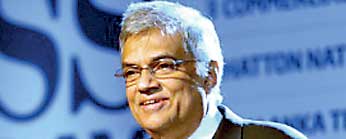Thursday Feb 19, 2026
Thursday Feb 19, 2026
Wednesday, 30 September 2015 00:28 - - {{hitsCtrl.values.hits}}
By Charumini de Silva
Prime Minister Ranil Wickremesinghe yesterday said that the Government’s focus for the next two years would be on re-establishing and strengthening a democratic society.
“Today in Sri Lanka the biggest challenge of good governance applies to all of us in terms of re-establishing and strengthening a democratic society. Hence, our primary objective and obligation is to establish a fully-democratic society in the next two years,” he said, delivering the keynote address at the National Management Conference 2015, organised by the Institute of Management of Sri Lanka yesterday.
Wickremesinghe said that the good governance challenge was not only a challenge for the Government and Parliament but also a challenge for a democratic society.
“Good governance is the only way that the sovereignty of the people can be safeguarded. There will always be extremists on either side who will oppose it for different reasons, but the people as a whole have to face this challenge in re-establishing and having a strong and vibrant democratic society in which you will feel safe,” he added.
He said that good governance was not limited to enterprises and the corporate sector.
“The Government is trying to bring reconciliation to Sri Lanka as a democratic country. We cannot do that only by building ourselves to judiciary mechanisms or non-judiciary mechanisms. It must be in the background of a highly functional democracy. We will work it out and reduce bad habits and see where we can work together. This was also the basis on which the main parties of Sri Lanka, the UNP and the SLFP, got together to form a Government for two years,” he added.
He went on to say that from the day that the resolution is passed, Sri Lanka will have two years until 2017 to implement the country’s democratic practices.
Outlining what the Government intended to do Wickremesinghe said: “Firstly as President Maithripala Sirisena announced in New York, we require a new Constitution. Secondly, the issue of how we can dissolve powers, analysis of the shortcomings of the present structure and what more can be done are the key main issues that we have to deal with.”
However, the Premier went on to say that the powers of Parliament had been downgraded progressively over the years and it was time this was corrected.
“We have got to strengthen the Parliament. We are proposing an oversight committees following the model of the European Union Parliament, a parliamentary budget office because it is the Parliament’s duty to keep control of public finances and making the Jayawardene centre a research and training centre for parliament.”
Speaking about executive powers, the Prime Minister said that executive power had to be handed over to the Cabinet and most of the issues concerned the Judiciary.
“Actually, during the discussions of the UN resolution the only issue that came out was not about war crimes or the armed forces but about the judiciary. Have we got a sufficiently strong judiciary?” Wickremesinghe assured.
He went on to say that everyone was keen that they found out the truth, but then finding out the truth means reconciliation cannot suffer.
“We have to look at the victims; what compensation and what else do we do for them?” he added.
The Premier explained several measures the Government was implementing at present and said: “A permanent office to investigate missing persons has been established along with a special council that will look into all these issues that come up and the allegations. Then we move on to a new truth commission which is different from those used in South Africa and other countries; it will have two major components.
“It will be like Parliament with two houses. You will have the commission per say headed by independent individuals and then there will be a compassionate committee. Now this is new. The compassionate council will be manned by members of the clergy selected by the Mahanayakes, the Cardinal and key Muslim and Hindu priests and they will decide a course of action.”
“We have to find a middle way and being Sri Lankan we found our own way. We put our heads together with some of the religious leaders, civil societies and even the Tamil and the Muslim communities and we came together to ensure that we could have our own mechanism to restore good governance. At the very base of this is the creation of a democratic society,” Wickremesinghe said.
Noting the importance of freedom of speech and religion, he said that everyone should have the same rights that citizens within the European Union enjoyed.